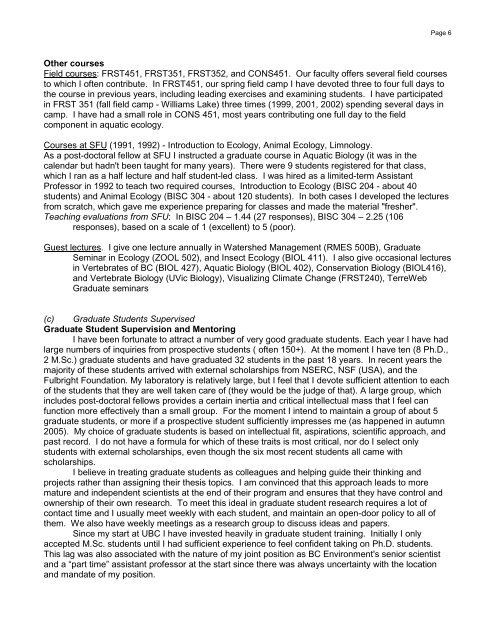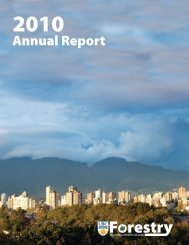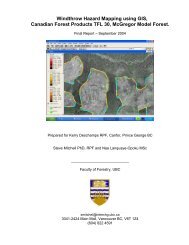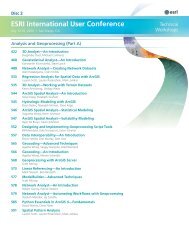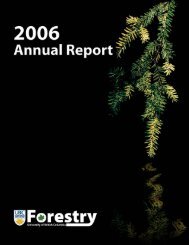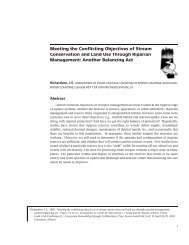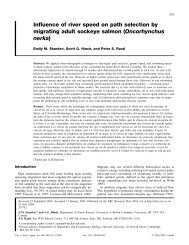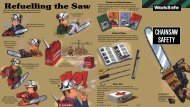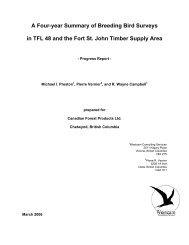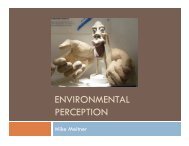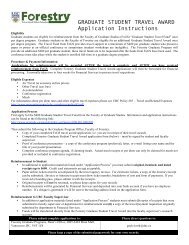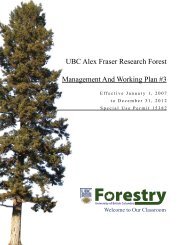THE UNIVERSITY OF BRITISH COLUMBIA - Courses
THE UNIVERSITY OF BRITISH COLUMBIA - Courses
THE UNIVERSITY OF BRITISH COLUMBIA - Courses
Create successful ePaper yourself
Turn your PDF publications into a flip-book with our unique Google optimized e-Paper software.
Page 616BOther coursesUField coursesU: FRST451, FRST351, FRST352, and CONS451. Our faculty offers several field coursesto which I often contribute. In FRST451, our spring field camp I have devoted three to four full days tothe course in previous years, including leading exercises and examining students. I have participatedin FRST 351 (fall field camp - Williams Lake) three times (1999, 2001, 2002) spending several days incamp. I have had a small role in CONS 451, most years contributing one full day to the fieldcomponent in aquatic ecology.U<strong>Courses</strong> at SFUU (1991, 1992) - Introduction to Ecology, Animal Ecology, Limnology.As a post-doctoral fellow at SFU I instructed a graduate course in Aquatic Biology (it was in thecalendar but hadn't been taught for many years). There were 9 students registered for that class,which I ran as a half lecture and half student-led class. I was hired as a limited-term AssistantProfessor in 1992 to teach two required courses, Introduction to Ecology (BISC 204 - about 40students) and Animal Ecology (BISC 304 - about 120 students). In both cases I developed the lecturesfrom scratch, which gave me experience preparing for classes and made the material "fresher".Teaching evaluations from SFU: In BISC 204 – 1.44 (27 responses), BISC 304 – 2.25 (106responses), based on a scale of 1 (excellent) to 5 (poor).UGuest lecturesU. I give one lecture annually in Watershed Management (RMES 500B), GraduateSeminar in Ecology (ZOOL 502), and Insect Ecology (BIOL 411). I also give occasional lecturesin Vertebrates of BC (BIOL 427), Aquatic Biology (BIOL 402), Conservation Biology (BIOL416),and Vertebrate Biology (UVic Biology), Visualizing Climate Change (FRST240), TerreWebGraduate seminars(c) Graduate Students Supervised24BGraduate Student Supervision and MentoringI have been fortunate to attract a number of very good graduate students. Each year I have hadlarge numbers of inquiries from prospective students ( often 150+). At the moment I have ten (8 Ph.D.,2 M.Sc.) graduate students and have graduated 32 students in the past 18 years. In recent years themajority of these students arrived with external scholarships from NSERC, NSF (USA), and theFulbright Foundation. My laboratory is relatively large, but I feel that I devote sufficient attention to eachof the students that they are well taken care of (they would be the judge of that). A large group, whichincludes post-doctoral fellows provides a certain inertia and critical intellectual mass that I feel canfunction more effectively than a small group. For the moment I intend to maintain a group of about 5graduate students, or more if a prospective student sufficiently impresses me (as happened in autumn2005). My choice of graduate students is based on intellectual fit, aspirations, scientific approach, andpast record. I do not have a formula for which of these traits is most critical, nor do I select onlystudents with external scholarships, even though the six most recent students all came withscholarships.I believe in treating graduate students as colleagues and helping guide their thinking andprojects rather than assigning their thesis topics. I am convinced that this approach leads to moremature and independent scientists at the end of their program and ensures that they have control andownership of their own research. To meet this ideal in graduate student research requires a lot ofcontact time and I usually meet weekly with each student, and maintain an open-door policy to all ofthem. We also have weekly meetings as a research group to discuss ideas and papers.Since my start at UBC I have invested heavily in graduate student training. Initially I onlyaccepted M.Sc. students until I had sufficient experience to feel confident taking on Ph.D. students.This lag was also associated with the nature of my joint position as BC Environment's senior scientistand a “part time” assistant professor at the start since there was always uncertainty with the locationand mandate of my position.


